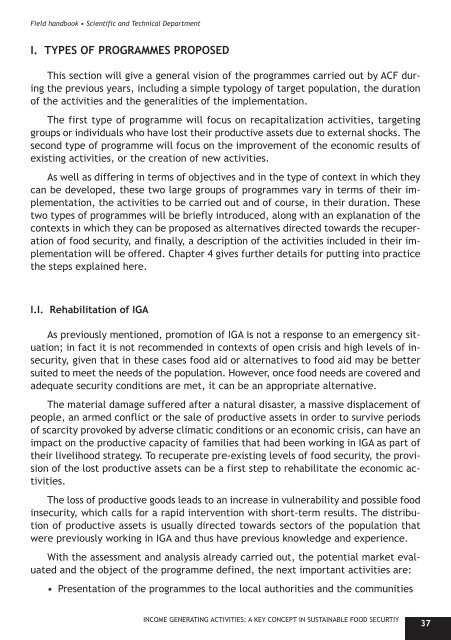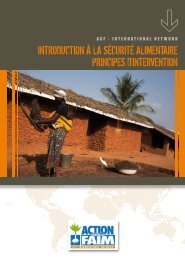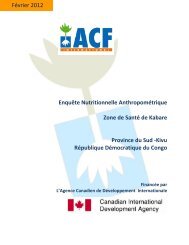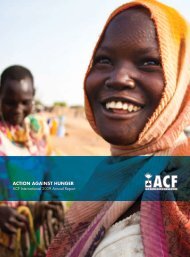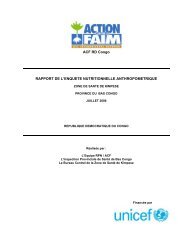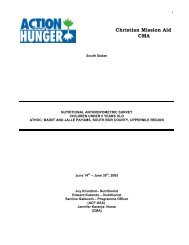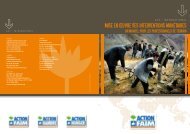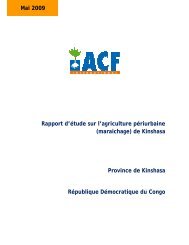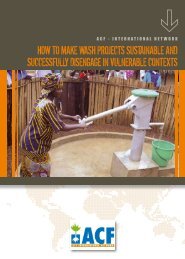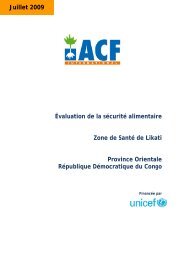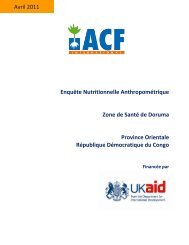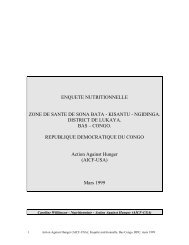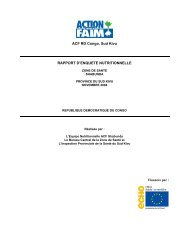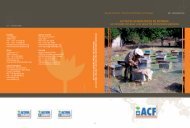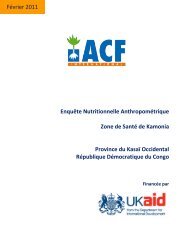Income-Generating Activities - Action Against Hunger
Income-Generating Activities - Action Against Hunger
Income-Generating Activities - Action Against Hunger
Create successful ePaper yourself
Turn your PDF publications into a flip-book with our unique Google optimized e-Paper software.
Field handbook • Scientific and Technical Department<br />
I. TYPES OF PROGRAMMES PROPOSED<br />
This section will give a general vision of the programmes carried out by ACF during<br />
the previous years, including a simple typology of target population, the duration<br />
of the activities and the generalities of the implementation.<br />
The first type of programme will focus on recapitalization activities, targeting<br />
groups or individuals who have lost their productive assets due to external shocks. The<br />
second type of programme will focus on the improvement of the economic results of<br />
existing activities, or the creation of new activities.<br />
As well as differing in terms of objectives and in the type of context in which they<br />
can be developed, these two large groups of programmes vary in terms of their implementation,<br />
the activities to be carried out and of course, in their duration. These<br />
two types of programmes will be briefly introduced, along with an explanation of the<br />
contexts in which they can be proposed as alternatives directed towards the recuperation<br />
of food security, and finally, a description of the activities included in their implementation<br />
will be offered. Chapter 4 gives further details for putting into practice<br />
the steps explained here.<br />
I.I. Rehabilitation of IGA<br />
As previously mentioned, promotion of IGA is not a response to an emergency situation;<br />
in fact it is not recommended in contexts of open crisis and high levels of insecurity,<br />
given that in these cases food aid or alternatives to food aid may be better<br />
suited to meet the needs of the population. However, once food needs are covered and<br />
adequate security conditions are met, it can be an appropriate alternative.<br />
The material damage suffered after a natural disaster, a massive displacement of<br />
people, an armed conflict or the sale of productive assets in order to survive periods<br />
of scarcity provoked by adverse climatic conditions or an economic crisis, can have an<br />
impact on the productive capacity of families that had been working in IGA as part of<br />
their livelihood strategy. To recuperate pre-existing levels of food security, the provision<br />
of the lost productive assets can be a first step to rehabilitate the economic activities.<br />
The loss of productive goods leads to an increase in vulnerability and possible food<br />
insecurity, which calls for a rapid intervention with short-term results. The distribution<br />
of productive assets is usually directed towards sectors of the population that<br />
were previously working in IGA and thus have previous knowledge and experience.<br />
With the assessment and analysis already carried out, the potential market evaluated<br />
and the object of the programme defined, the next important activities are:<br />
• Presentation of the programmes to the local authorities and the communities<br />
INCOME GENERATING ACTIVITIES: A KEY CONCEPT IN SUSTAINABLE FOOD SECURTIY<br />
37


